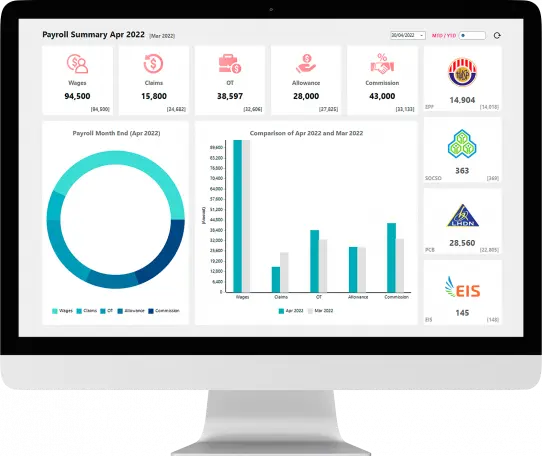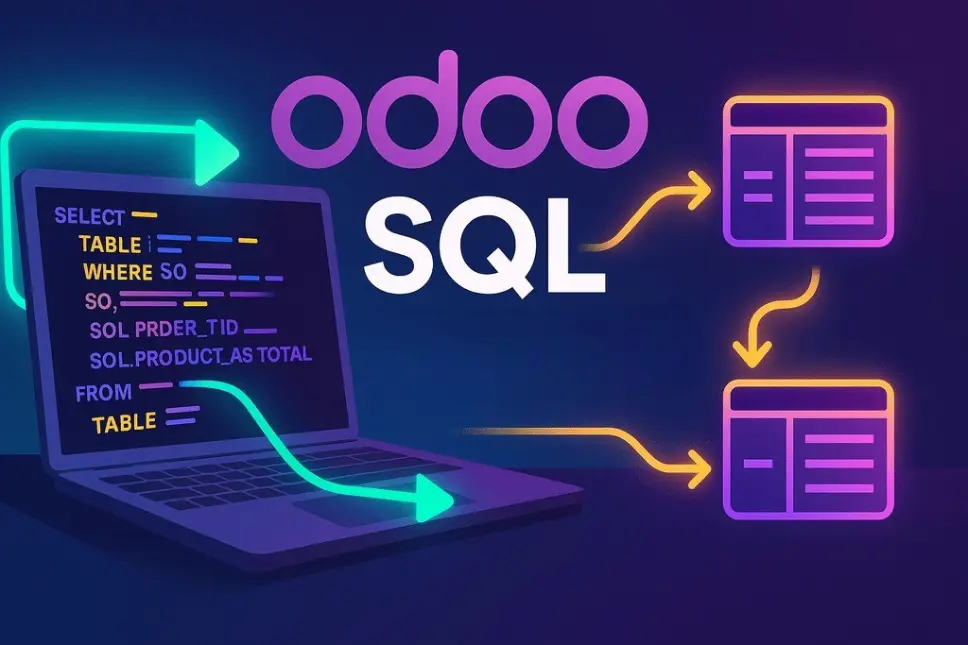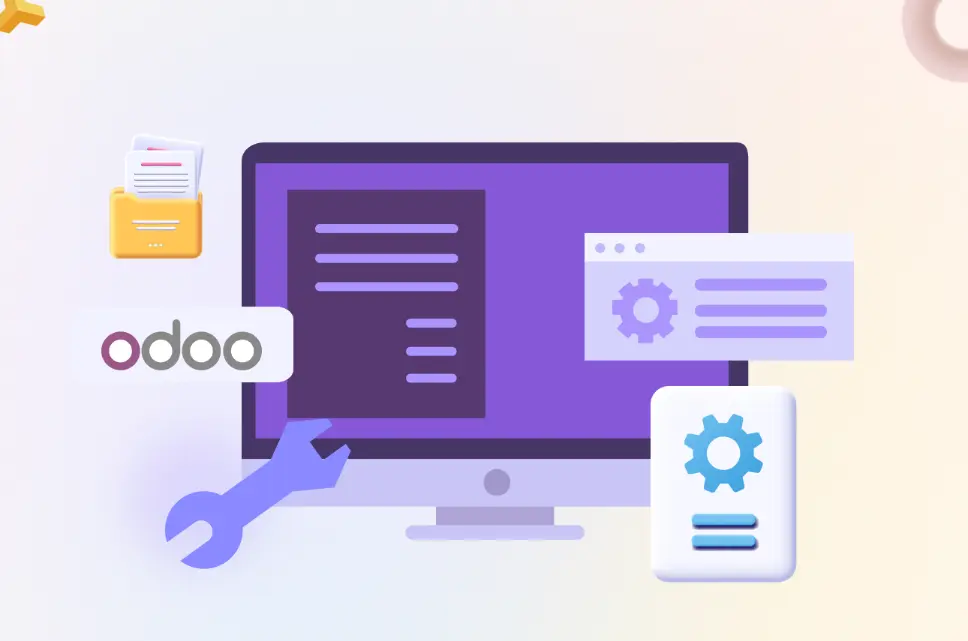Malaysian businesses are thriving increasingly in today's new digital economy and the impact of the digital economy on Malaysia's GDP cannot be understated. As companies continue to expand, many find that their traditional SQL database systems have not been able to offer a complete solution and are therefore seeking better solutions. Odoo ERP is one such transformative platform that is providing a better alternative in how Malaysian businesses can manage their accounting and operations.
SQL Database Departmental Silos vs Odoo Integration
Most Malaysian SMEs have forced themselves to undergo digital transformation via departmental SQL databases, creating separated systems for accounting, sales, inventory, and HR personnel. This fragmented way of working should be avoided, as it only causes operational inefficiencies that become exaggerated once the business and customer base expands, thus limiting the Malaysian business from achieving competitive advantage in an increasingly fast-paced environment.
The Departmental Isolation Problem
Malaysian businesses that use a SQL database typically have their departments established in isolation and operate separately:
- Accounting Department: Has one SQL database that includes financial records, invoicing, and tracking expenses.
- Sales Team: Operates a 'customer' database that includes pricing, quotations, and order history.
- Warehouse-Inventory Department: Operates as a separate stock management system with supplier and purchase data independent from financial data.
- HR Department: Has their own separate employee database with payroll and hours/attendance records.
The Trickle Down Effect of Inefficiencies
The Trickle Down Effect of Inefficiencies
- Sales department puts in order information in their SQL database
- Inventory department checks stock in a separate DB manually
- Accounting takes the sales info to create an invoice (manually re-entering info)
- Human Resources separately processes sales commission (also a manual entry)
- Senior management has a difficult time getting a real-time snapshot of activities across the business.
Instead of taking a maximum of 30 minutes with all the information in one integrated system, the process now takes 2-3 hours with clutter and errors from multiple touchpoints and manual entries.
The Hidden Costs of Departmental SQL Systems

Malaysian businesses continue to lose more than just time - they will lose competitive advantage.
- Delays in decision making are caused when information is fragmented across departments when it comes to reporting.
- Customers complain because they received contradictory information from different departments and were ultimately unhappy.
- Compliance risks with regulations - non compliance problems can arise when the correct data does not reconcile for SST reporting.
- There is potential growth limits because manual processes do continue to grow that does not allow for the business to expand.
- Frustration of staff who repeat processes that involve entry of the same data multiple times and switch from application to application.
Traditional SQL database setups create artificial barriers between departments that should work seamlessly together. In contrast, Odoo ERP eliminates these silos, creating the operational efficiency Malaysian businesses need to compete regionally and globally.
The Integration Advantage: Odoo's Unified Approach
Single Source of Truth: Unlike departmental SQL databases, Odoo creates one unified system where:
- Customer places an order → Automatically updates inventory, triggers accounting entry, notifies production
- Inventory receives goods → Immediately updates inventory amount, supplier payment, and cost accounting
- Employee completes a sale → Commission is instantly calculated, performance metrics updated in real time
- Management examines performance → Live dashboards are driven by integrated work of each department
The Evolution from SQL Databases to Modern ERP
In Malaysia, numerous SMEs started their digital journey by moving to utilising basic SQL databases for customer data, inventory, and basic accounting transactions. While they were effective for customer and inventory management, once these companies began searching for more in-depth accounting solutions, they very quickly discovered frustrations surrounding SQL-based systems.
Traditional SQL database setups often result in:
- Data silos whereby information is published at different rates relative to customer order
- Manual data entry to different systems without consistency in original data
- Limited optionality of reporting can impede decision making and validation of our customers situations
- Scalability is difficult to project and manage as business volume grows
- Compliance becomes difficult with updates to Malaysian tax laws and applicable local tax authority
Key Comparison Metrics: Odoo ERP vs Traditional SQL Database Systems
In order to help make decisions easier for Malaysian businesses, we have included a thorough comparison between SQL database systems and Odoo ERP across key business metric:
Comparison Factor | Traditional SQL Database | Odoo ERP | Impact for Malaysian Businesses |
|---|---|---|---|
Flexibility & Customization |
| ✓ User-friendly customization interface ✓ Drag-and-drop report builder ✓ Extensive app marketplace ✓ Built-in workflow automation ✓ No-code/low-code customization | Malaysian SMEs can adapt quickly to changing regulations (SST updates, compliance changes) without expensive developer resources |
Integration Capabilities |
| ✓ Native integration across all modules ✓ Real-time data synchronization ✓ 30,000+ ready-made integrations ✓ REST API for external systems ✓ Malaysian banking & payment gateways | Eliminates duplicate data entry, reduces errors, and provides unified view essential for Malaysian tax reporting and compliance |
Cost Implications | Initial Setup: • Database licenses: RM 15,000-50,000 • Custom development: RM 30,000-100,000 • Infrastructure: RM 10,000-25,000 Ongoing Costs: • Maintenance: RM 5,000-15,000/month • Updates: RM 10,000-30,000/year • Support: RM 3,000-8,000/month | Initial Setup: ✓ Odoo licenses: RM 200-800/user/month ✓ Implementation: RM 20,000-60,000 ✓ Training: RM 5,000-15,000 Ongoing Costs: ✓ Subscription: RM 200-800/user/month ✓ Support included ✓ Free updates | 40-60% lower total cost of ownership over 3 years, predictable monthly expenses ideal for Malaysian SME cash flow management |
User Experience |
| ✓ Intuitive web-based interface ✓ Mobile apps for iOS/Android ✓ Role-based dashboards ✓ Consistent user experience ✓ Built-in help and documentation | Reduces training time for Malaysian staff, improves adoption rates, enables remote work capabilities crucial post-COVID |
Scalability |
| ✓ Cloud-based auto-scaling ✓ Handles millions of records efficiently ✓ Unlimited users (plan dependent) ✓ Multi-company & multi-currency ✓ Global deployment ready | Supports Malaysian businesses expanding regionally (ASEAN markets), handles growth from 10 to 1000+ employees seamlessly |
Reporting & Analytics |
| ✓ Drag-and-drop report builder ✓ Interactive dashboards ✓ Real-time analytics ✓ 200+ pre-built reports ✓ Malaysian regulatory reports included | Essential for Malaysian businesses needing SST reports, management accounts, and performance tracking for bank loan applications |
Security & Compliance |
| ✓ Role-based access control ✓ Automated daily backups ✓ Comprehensive audit logs ✓ GDPR & Malaysian PDPA compliant ✓ ISO 27001 certified infrastructure | Meets Malaysian regulatory requirements, reduces compliance risks, protects customer data as required by PDPA |
Maintenance & Support |
| ✓ Managed cloud infrastructure ✓ Automatic security updates ✓ 24/7 technical support ✓ Zero-downtime updates ✓ Local Malaysian support partners | Eliminates need for dedicated IT staff, reduces operational risks, ensures business continuity crucial for Malaysian SMEs |
ROI Analysis for Malaysian Businesses
Typical 3-Year Comparison for a 50-employee Malaysian company:
Cost Category | SQL Database Setup | Odoo ERP | Savings |
|---|---|---|---|
Year 1 | RM 180,000 | RM 120,000 | RM 60,000 |
Year 2 | RM 95,000 | RM 65,000 | RM 30,000 |
Year 3 | RM 105,000 | RM 70,000 | RM 35,000 |
Total 3-Year Cost | RM 380,000 | RM 255,000 | RM 125,000 |
Additional benefits: 25% reduction in month-end closing time, 40% fewer data entry errors, 60% faster report generation
Additional Resources with Malaysian-Specific Modules
Accounting Module Features
- Pre-configured Malaysian chart of account and statutory obligations for Malaysian accounting methods
- Automated SST reporting and calculation
- Integrated EPF/SOCSO with current statutory obligations
- Multi-currency support for any businesses trading across ASEAN markets
Payroll Management
- Full integration of Malaysian statutory requirements
- Advanced bonus calculation functionality that allows for both the 13th month and performance bonuses
- Full leave management functionality that considers the Malaysian public holidays
- Tax calculations that are automated and follow the LHDN guidelines
Inventory Control
- Multi-site support designed for full Malaysian coverage
- Integration with Malaysian logistics and courier providers
- Real-time stock tracking across warehouses in different states
- Re-order functionality that automatically calculates lead-times based on Malaysian suppliers.
Local Partner Ecosystem
The Odoo ecosystem in Malaysia has matured, and support can now be offered across the major business centers:
Geographic Coverage:
- Certified Odoo partners in active locations of Kuala Lumpur, Penang, and Johor Bahru
- Malaysian consultants who focus on Malaysian manufacturing, retail, and services industries
- Regional experience covering East Malaysia operations which includes Sabah and Sarawak
Language and Cultural Support:
- Training is available in English, Bahasa Malaysia and Mandarin
- Documentation is translated into the contexts of Malaysia and its businesses
- Cultural understanding of local business practices and regulatory requirement
Success Metrics to Consider
Clear, well-established benchmarks will ensure that your Odoo implementation will deliver the value you expect:
Implementation Timeline
- Target 8-12 weeks for full deployment of core modules
- Phased rollout approach minimizes business disruption
- Milestones will provide a measurement of achieving progress against your implementation timeline.
User Adoption Metrics
- 60 days from go-live for 85%+ user adoption.
- Regular training sessions and support to overcome initial resistance
- User feedback integration to optimize system configuration
Financial Returns
- Timelines of ROI often break even in 12-18 months for Malaysian SMEs.
- Efficiency, huge process improvement (30-50%) and reduction in manual processes.
- Measurable improvements in month-end closing times and reporting accuracy
Operational Excellence Measures
- Data accuracy improvements through elimination of duplicate entry
- Faster decision-making through real-time integrated reporting
- Enhanced compliance tracking and audit trail capabilities
The Migration Journey: From SQL to Odoo

Phase 1: Assessment and Planning
Data Audit - Evaluate how the SQL database is currently built and identify all data points needing to be migrated.
Process Mapping - Document current workflows and identify opportunities for improvement with Odoo's integrated approach.
Customization Requirements - business identifies and clarifies specifically for Malaysian business context that needs customisation.
Phase 2: Implementation Strategy
Phased approach - start the phased approach with the key accounting modules needed and then consider implementing to other business areas.
Data Migration - migrate historical data from the SQL database using Odoo's import functions and ensure integrity of records is maintained.
User Training - provide final training for the staff are equipped with skills to adopt Odoo and when live maximise its capabilities.
Phase 3: Optimization and Growth
- Monitor Performance: Monitor certain metrics to ensure the system does not stray too far from business objectives.
- Continuous Improvement: Use the exciting bundle of Odoo apps to keep producing new functionality.
- Scalability Planning: You are now prepared for scalability considering Odoo's architecture.
Real-World Benefits for Malaysian Companies
Manufacturing Sector
A Johor-based electronics manufacturer migrated from multiple SQL databases to Odoo ERP system and cut their month-end closing time from 10 days to 3 days. The systems integration eliminated the manual consolidation of critical data and enabled real-time visibility of information across production, sales and finance department outputs.
Trading Companies
Malaysian trading companies benefit from Odoo's multi-currency capabilities and automated SST calculations, which are important because they trade with ASEAN nations. Odoo makes complex pricing structures and multiple suppliers easy to manage and operate.
Service Providers
Kuala Lumpur-based professional services firms used Odoo's project management and timesheet modules with accounting to create accurate billing and improve client relationship management.
Retail, Education, Healthcare, and More
Beyond the aforementioned industries, there are many others, such as retail, F&B, education, and healthcare, where Odoo is also widely utilized - with the same needs for real-time reporting, central customer management, and regulatory compliance.
Overcoming Common Migration Concerns

Data Security
Odoo ERP offers enterprise-level security with features like role-based access, encryption of data and regular security upgrades. For Malaysian companies with sensitive financial data, this is a significant upgrade from SQL database security.
Integration with Existing Systems
New Odoo applications can integrate via API with existing systems. For companies wishing to migrate without bringing the business down, this is especially useful for well-established Malaysian companies using legacy systems.
Compliance and Audit Trail
Odoo also have a significant audit trail, with far more options than most SQL interfaces provide, and allows audit trails to comply with Malaysian accounting standards while simplifying audits.
The Malaysian Advantage with Odoo
- Local Support Ecosystem: Malaysia already has a growing community of Odoo implementation partners and developers who understand the local needs of the business.
- Government-based Digitalization Support: Odoo ERP fits into the Malaysian drive for digitalization, meaning that businesses can apply for government grants and incentives.
- Regional Expansion: As business expand operations into the Southeast Asia region, Odoo's multi-company and multi-currency capabilities provide the base for seamless operations in the region.
Making the Smart Move
Transitioning to an Odoo ERP from SQL databases is more than just a tech upgrade - it is taking a step towards operational excellence. By making this transition, Malaysian businesses position themselves for:
- Better business decision making through real-time reporting and integrated reporting
- Improved competitiveness through better and streamlined operations
- Scalable business growth through modern and fluid technology
- Regulatory compliance through built-in Malaysian localization
In Conclusion
The migration from traditional SQL databases to Odoo ERP is a strategic change that Malaysian businesses can no longer afford to delay. As we have discussed in this paper, benefits of moving to Odoo ERP is more than just financial savings. It speaks to operational excellence, compliance with regulations, and competitive advantage in an increasing digital marketplace.
Quantitative Benefits:
- Implementation speed is 60-80% faster than custom SQL solutions which decreases the time-to-value for Malaysian businesses
- Total Cost of Ownership over 5 years is consistently lower by 40-60%, improving cashflow and profit
- User adoption rate of 90% during the first month (compare this with 60% for custom solutions) that increases the odds of reaching the desired digital transformation of your business
Qualitative Advantages:
- Future-proofed modular architecture to expand with your business i.e. across Malaysia and into ASEAN
- Active community support and regular updates to keep your system relevant using global best practices
- Full compliance with Malaysian regulations like SST, EPF and SOCSO with optional integrations
For SMEs
You don't need to blown the bank or take unnecessary risk to prepare for an ERP transformation. Start with the core modules or with Accounting, CRM, and Sales and take care of your immediate pain points. This allows for the take on the expansion at a manageable pace, and reduces your risk and cost. It is also important to remember that Malaysian's partner ecosystem is developing and offers powerful local support, in Bahasa Malaysia, to ensure cultural and linguistic compatibility as you embark on your digital journey.
For Larger Enterprises
Odoo Enterprise provides the more advanced features and SLA support that match the complexity of larger Malaysian organizations. Odoo's multi company functionality handles complex Malaysian corporate structures without issues, and the integration capabilities allow Odoo to seamlessly integrate with legacy systems. This enterprise-level approach helps accommodate the complexities of established Malaysian businesses while remaining agile to face future obstacles.
The transition from SQL databases to Odoo ERP is not just a technology upgrade, but a strategic investment in your Malaysian businesses future, competitiveness, scalability, and operational effectiveness. If planned properly, with the help of local partners, and implemented in phases, this transition will set your organization up for growth in Malaysia's ever-changing business ecosystem.
Are you ready to transform your Malaysian business with Odoo ERP? Contact us to review your needs and discuss how to begin your strategic trajectory from disconnected SQL databases to integrated excellence in your business management.
